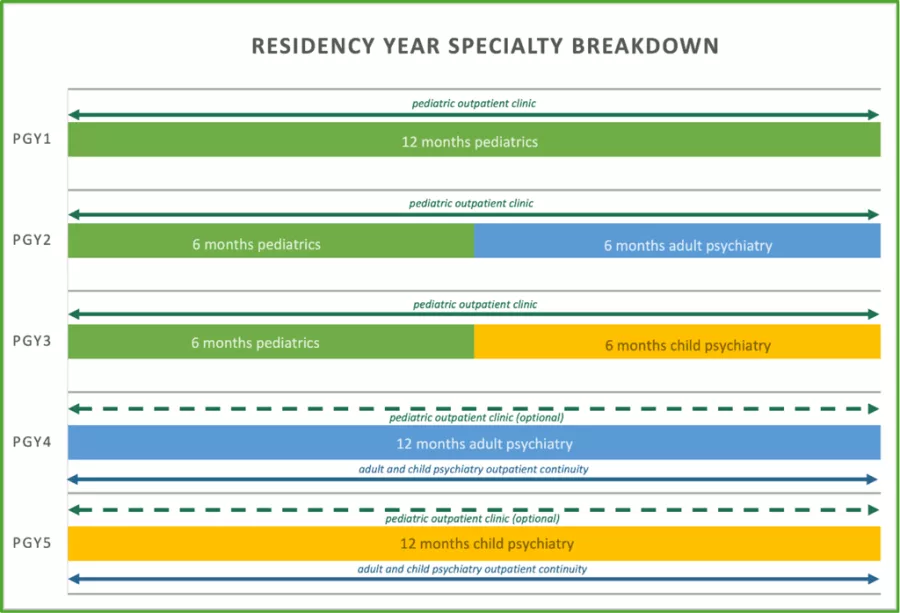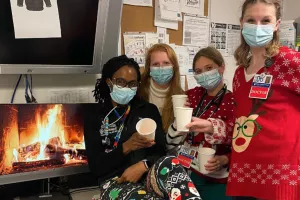The combined Triple Board program will be jointly managed by leadership at Boston Children's Hospital and Tufts Medical Center. Faculty from both institutions serve as core faculty for the combined program, and are involved in program evaluation and training responsibility with regard to curriculum, evaluation, administration and trainee mentorship. Cohesion is fostered among housestaff across both institutions and all relevant departments, with integration of Triple Board residents into learning opportunities including didactic conferences, Grand Rounds, clinical experiences, and scholarly and research activities.
Training Overview

General Overview of Rotations
Note: these are sample rotation breakdowns and are subject to change. For more information, including rotation descriptions, at each clinical training site, follow the links below to individual training program pages. Please note that not all rotations at each clinical site are completed by Triple Board trainees.
Boston Children’s Hospital Virtual Tour
12 months of General Pediatrics at Boston Children’s
- Pediatric Inpatient Medicine: ~14 weeks
- General Pediatric Hospital Medicine: 6 weeks
- Pediatric Specialties Inpatient Medicine: 4 weeks
- Admit: 2 weeks
- BMC Wards or Ward Nights: 2 weeks
- Pediatric Intermediate Care Unit: 2 weeks
- Newborn Nursery @ BMC: 4 weeks
- Emergency Medicine: 4 weeks
- @ BMC: 2 weeks
- @ BCH: 2 weeks
- NICU: 6 weeks
- @ BWH: 4 weeks
- @ BMC: 2 weeks
- Primary Care: 2 weeks
- Keystone (incl. Development, Adolescent, Advocacy): 12 weeks
- Neuro: 4 weeks
- Total weeks of nights: ~6 weeks + cross coverage
- Vacation: 4 weeks + 5 day holiday break based on preference
6 months of General Pediatrics at Boston Children’s
- Elective: 2-4 weeks
- Medical/Surgical ICU: 4 weeks
- Pediatric Inpatient Medicine: ~10 weeks
- General Pediatric Hospital Medicine: 4-8 weeks
- Pediatric Specialties Inpatient Medicine: 4-8 weeks
- Complex Care Medicine: 0-2 weeks
- BWH Delivery Room: 0-2 weeks
- Primary care: 2 weeks
- Emergency Medicine: 4
- @ BMC: 2 weeks
- @ BCH: 2 weeks
- Total weeks of nights: ~4 weeks + cross coverage
- Vacation: 2 weeks
6 months of Adult Psychiatry at Tufts
- Consult and Liaison Psychiatry: 1 month
- ED Psychiatry: 1 month
- Inpatient Adult Psychiatry: 4 months
- 24-hour call: ~14 shifts
- Vacation: 2 weeks
6 months of General Pediatrics at Boston Children’s
- Elective: 2-4 weeks
- Medical ICU: 4 weeks
- Emergency medicine: 2-4 weeks
- Inpatient Pediatric Medicine: ~4 weeks
- General Pediatric Hospital Medicine: 2-4 weeks
- Pediatric Specialties Inpatient Medicine: 2-4 weeks
- Admit: ~1 week
- Total weeks of nights: ~3 weeks
- Vacation: 2 weeks
6 months of Child and Adolescent Psychiatry at Boston Children’s
- Psychiatry Consult Service: 2 months
- Inpatient Child Psychiatry: 2 months
- ED Child Psychiatry: 1 month
- Community-Based Acute Treatment (CBAT): 1 month
- Vacation: 2 weeks
12 months of Adult Psychiatry at Tufts
- Consult/Liaison Psychiatry: 1-2 months
- Consult Addiction Psychiatry: 1-2 months
- Emergency Room Psychiatry: 1 month
- Adult Outpatient Neurology: 1 month
- Inpatient Geriatric Psychiatry: 1 month
- Outpatient intake clinics, community psychiatry, and outpatient continuity: 6 months
- Vacation: 4 weeks
- Nights: None!
12 months of Child and Adolescent Psychiatry at Tufts and Boston Children’s
- General Pediatrics Board Exam: October
- Child/Adolescent ED Psychiatry coverage @ Tufts: 3 months
- Electives: variable
- Short-term community consult psychiatry clinic: 1 half day/week for 3 months
- Integrated Behavioral Health @ Tufts General Pediatrics clinic: 1 half day/week for 3 months
- Massachusetts Child Psychiatry Access Program (MCPAP): 1 half day/week for 3 months
- Neurodevelopmental Psychiatry Clinic: 1 half day/week for 3 months
- Trauma clinic: 1 half day every 2 weeks for 3 months
- Psychotherapy Clinic: 1 half day every 2 weeks for 3 months
- Mood and Anxiety Clinic: 1 half day/week for 3 months
- ADHD Clinic: 1 half day/week for 3 months
- School Psychiatry: 2 half days/week for 3 months
- Community Child Psychiatry: 1 day/week for 3 months
- Court/Forensic Child Psychiatry: 1 half day/week for 3 months
- Child Psychiatry Intake and Specialty clinics: 1-2 half days/week for 9 months
- Vacation: 4 weeks
- Nights: None!
Outpatient Continuity Experiences
Outpatient pediatric continuity clinic is mandatory PGY1-3. All triple board trainees have their continuity clinic at Tufts Medical Center, in the General Pediatrics Clinic. In general, we try to schedule triple board trainees on Tuesday afternoons, though this can be variable! When on pediatrics, continuity clinic is scheduled on average one afternoon per week. When on adult or child psychiatry, continuity clinic is scheduled every other Tuesday afternoon, during which time you are excused from your psychiatry or child psychiatry rotations. Trainees have the option of continuing continuity clinic in PGY4-5, with their choice of clinic scheduling and frequency.
Trainees are assigned both adult and child/adolescent outpatient psychiatry patients starting in PGY4 and continuing through PGY5. Scheduling outpatients is at the trainee’s discretion, and is usually coordinated to fit the schedule of whatever rotation they are on at that particular time. Trainees are assigned 2 child psychiatry attending supervisors and 2 adult psychiatry attending supervisors, with whom they meet approximately weekly to discuss their outpatient panel and clinic decisions. Outpatients consist of diagnostic evaluations, psychiatric med management, and psychotherapy of all ages. PGY4s are required to have on average 15 outpatient encounters per month, and PGY5s are required to have on average 38 outpatient encounters per month. Outpatient psychiatry clinic is an excellent opportunity to practice independence in clinical decision-making, with easily-available support from attendings in the department. It is also a valuable time to establish meaningful continuity with patients over the 2 final years of training.
Didactics + Education
Didactics at Boston Children’s are held from 12-1pm Monday-Friday. Coverage of pagers is provided during didactics. Noon conference didactics are composed of Grand Rounds, resident as teacher presentations, core didactic lectures, board exam review, case conferences, and skills sessions. Free lunch is provided during noon conference. There are additional specialty-specific educational conferences on individual rotations.
Adult psychiatry didactics are held each Wednesday, from 1 – 5 pm for PGY2s and from 10:15 am – 5 pm for PGY4s. Junior level didactics cover a wide breadth of introductory psychiatry topics, including introductory lecture series in psychopathology, psychopharmacology, psychodynamics, psychiatric case formulation, neuropsychiatry, and note-writing. There is additionally an patient interviewing workshop series. There are additional guest lecturers covering special topics such as ECT, psychotherapy modalities, psychedelic psychopharmacology, medical psychiatry, and eating disorders, among others. Senior level didactics additionally include courses in various psychotherapy modalities, psychodynamic case conference, advanced psychopharmacology, and the business of psychiatry.
During PGY3, child psychiatry didactics are held at Boston Children’s on Wednesday mornings. These didactics consist of T-groups (group processing), psychopharmacology, therapy didactics, Grand Rounds, and Morbidity and Mortality conference. Journal Club is held on Fridays from 12-1pm. There are additional didactics held virtually and in-person on Thursday mornings combining child psychiatry trainees at all Harvard-affiliated CAP programs (including BCH, Cambridge Health Alliance, and MGH/McLean), with a wide breadth of topics covered.
PGY5 child psychiatry didactics are held at Tufts Medical Center on Wednesdays from 9am – 2pm. Topics vary broadly and include pediatric psychopharmacology, childhood development, psychotherapy modalities for children, family therapy, neurodevelopmental disorders of childhood, management of child psychiatry emergencies, psychiatry of chronic illness, developmental trauma, among others. There is an additional lecture series hosted by Dr. Chase Samsel at BCH for 1 hour, once per week, titled Introduction to Practice. This very useful course covers important topics in career psychiatrist finances, contract negotiation, job opportunities and structure in child psychiatry, and private practice.
Triple Board didactics are a new initiative meant to bring together triple board residents in all 5 years of training to discuss topics relevant to our cross-disciplinary work and potential multidisciplinary job opportunities. They are held virtually from 12-1pm once per month to allow residents at any clinical site to join. This series features guest lecturers in multiple disciplines discussing topics at the intersection of medical pediatrics and psychiatry, such as psychiatry of chronic illness, psychiatric oncology, eating disorder care, integrated behavioral health, among others.

Call, Weekends, Holidays + Nights
Pediatrics at Boston Children’s and Boston Medical Center uses a night float system. There are no 24-hour calls on any pediatrics rotations. There are 1-2 week blocks of night float, depending on the rotation. Night float entails coverage of 1-2 services at most and is jointly managed by an intern and senior resident. Attending pediatric hospitalists, critical care pediatricians, ED physicians, and neonatalogists are respectively in-house overnight. Most months, there is a full 2-day weekend worked, a half (1-day) weekend worked, and a full 2-day weekend off. There are additionally occasional cross-coverage holiday or weekend days or nights during elective and outpatient months. Holiday coverage is handled on a preference-based system.
Adult Psychiatry at Tufts Medical Center operates on a 24-hour call schedule. Triple Board residents take 24-hour call roughly 14 times during their 6 months on adult psychiatry in PGY2. 24-hour call on a weekday is followed by a post-call day. 24-hour call can also be on weekends. 24-hour call on adult psychiatry entails coverage of the inpatient psychiatry unit, consult psychiatry patients, and ED psychiatry consults, with attending staffing overnight by phone. There is no call (and no weekends or nights) on adult psychiatry during PGY4. Typically there is one call assigned on a holiday during PGY2 adult psychiatry, with the opportunity to indicate preferences for holidays off.
Child Psychiatry during PGY3 at Boston Children’s involves call with coverage of the inpatient unit and ED consults. Typically, call is taken at home with a requirement to come into the hospital when called in, with a bonus payment system for coming into the hospital when on call. During PGY5, call coverage is at Tufts and is phone-coverage only. There are 6 weeks of home phone call (covering weeknights and weekend day/nights), with no need to come into the hospital overnight. CAP fellows on call come in on the weekend only if there is a child psychiatry patient boarding in the emergency room.